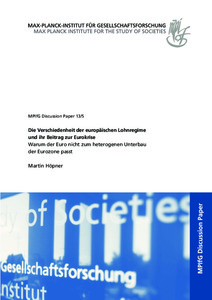Die Verschiedenheit der europäischen Lohnregime und ihr Beitrag zur Eurokrise: warum der Euro nicht zum heterogenen Unterbau der Eurozone passt
"Euro member states possess very different wage bargaining regimes. This heterogeneity has shaped the diverging wage and price increases among European member states and has therefore contributed to the real exchange-rate distortions from which the eurozone has suffered since the introduction o...
| Main Author: | |
|---|---|
| Institution: | ETUI-European Trade Union Institute |
| Format: | TEXT |
| Language: | German |
| Published: |
Köln
2013
MPIfG |
| Subjects: | |
| Online Access: | https://www.labourline.org/KENTIKA-19126961124919441439-Die-Verschiedenheit-der-europa.htm |
| Summary: | "Euro member states possess very different wage bargaining regimes. This heterogeneity has shaped the diverging wage and price increases among European member states and has therefore contributed to the real exchange-rate distortions from which the eurozone has suffered since the introduction of the common currency. This paper analyses nominal wage increases in twelve euro countries during the first ten euro years, 1999- 2008, to demonstrate the above. Neither the European-wide export of German-style wage bargaining nor European-level wage coordination can be expected to solve the problem of heterogeneous wage pressures. It is therefore unlikely that the euro will function any better in the future than it has in the past." |
|---|---|
| Physical Description: | 23 p. Digital |

